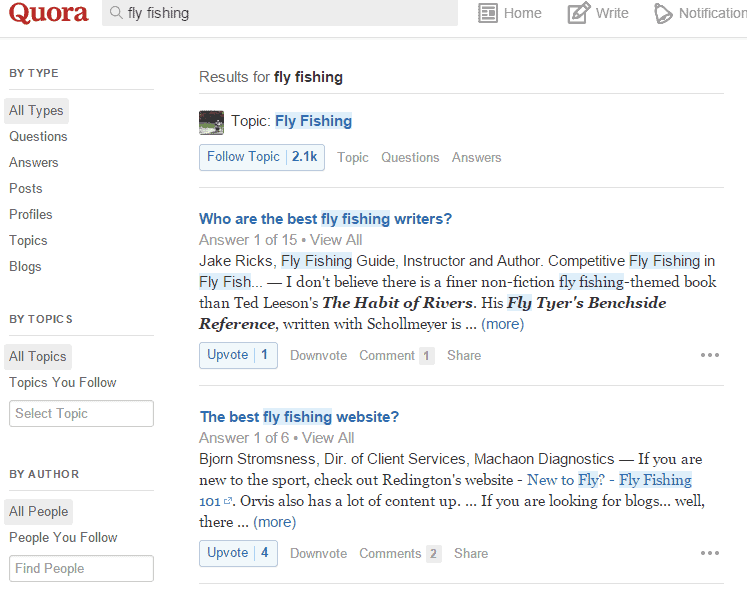If you’ve read our blog for very long, then you’ll know that one of the most important elements of online marketing that we advocate is thought leadership. In order for people to get to know, like, and trust you enough to do business with you, you’ve got to establish yourself as a leader in your industry by showing off your expertise.
How do you do this? Every single aspect of your online marketing strategy should be working towards this goal, from the topics you address on your blog and in your email newsletters, to the guest posts you write for your outreach efforts, and from your conversations on social media, to the keywords you choose for SEO.
Taking an active part in the conversations going on in your industry is the best way for you to demonstrate what an authority you are in the field – and attract potential customers. By sharing tips and answering questions in a helpful – and not salesy – way, people will come to see your company as their go-to resource when they need information about your industry. And when it comes time to buy, they’ll naturally think of your brand first. LinkedIn Groups is the social media channel most often mentioned in this context, and it does provide stellar opportunities for showing off your expertise. But another platform has been growing in popularity and reach, and should now be considered equally as important in any solid digital marketing strategy.
That platform is Quora. If you haven’t signed up for an account with Quora yet, do it now.
With over 10 million visitors each month, this is a channel you can’t afford not to tap into. How does it work? As with other social media platforms, you create a profile and then interact with other users. The difference in Quora is the fact that it’s not so much about following people, but instead, following topics. People ask questions within certain subject areas, which anyone can then answer. Everyone following that subject area will see those questions and answers, with the most active conversations taking precedence, of course. This is ideal for a business looking to market themselves via Quora. Think about it.
You don’t have to think up ways to get people to follow you or like your page in order to reach them on a regular basis. All you have to do is start contributing to the conversations going on about topics that are related to your business, and people following those topics will automatically see your content in their feeds and emails. Better yet, it won’t seem pushy or salesy at all, but helpful, since this is a topic they’re interested in. You’re doing nothing more than sharing your knowledge with an already engaged audience, not trying to persuade anyone to do anything.
Quora is different from many other Q&A sites in a couple of important ways.
First, the site employs editors who read and monitor posts to maintain quality. This, plus the upvote-downvote function that lots of websites use, discourages users from posting idiotic or offensive things just for the sake of posting them.
Second, users are supposed to use their real names and to provide a brief explanation of why they’re qualified to answer the question. So if you post a question about social media marketing and you get a response from someone who says they’re an experienced social media marketer with X marketing agency, you can probably trust their answer.
That’s the simplest way to use Quora: post a question, see what people answer, upvote or downvote answers accordingly. But that alone will not help a brand engage its followers.
Quora’s potential for marketers lies in both asking thoughtful questions and providing well-written responses—in other words, in sharing useful information that an audience values. Sounds exactly like content marketing, doesn’t it?
Quora’s potential for marketers lies in sharing useful information that an audience values. Share on XHere’s how to get started:
First, set up a robust profile. You won’t get anywhere if your answers interest someone enough that they check out your profile – only to find there’s not much there. Describe your company and your own experience and expertise. Link to your website and your other social media pages. Make it easy for people to find you and learn more about you.
Second, find topics related to your industry, and then follow them. Search for topics that are connected to your field, and follow every topic where you think someone might ask a question related to your industry. That way you’ll be updated when those questions arise and are able to contribute right away.

Third, take the vital but often forgotten step of customizing your bio for each topic you’re following. On your profile page, under Topics, you can edit the short bios that will appear next to your name when you answer any question in a particular topic. Each topic can have its own unique bio, or you can use the same one for all topics. This is a great way to convey your experience in several different areas that are all related to your business.
Fourth, start answering questions! Find questions where your business expertise would be helpful, and then write informative answers. Feel free to link out to your blog or website, but be careful – only do so if it won’t come across as self-promotional.
So if your business sells fishing equipment, for example, you could choose topics like fishing, fly fishing, and bass fishing to follow. You could add outdoor gear, too, and anything else you think might be related.

You’ll see a list of questions that users have asked, and you can start contributing right away.
Fifth, try asking a few questions of your own. You’ll want to make these questions as thought-provoking as possible – remember, you’re the expert, so these should be high-level questions. You could ask consumers to share their experiences or discuss a trending topic in the industry. Don’t forget to reward people for answering by upvoting and thanking them for posting.
In our fly fishing example above, you could start with something like “What’s the greatest innovation in the fishing industry since 1950?” You’re bound to get interesting answers, and they may even spark an idea for a new product or marketing campaign.
Sixth, connect with other Quora users interested in your industry. Quora also allows users to search for the top answerers and followers in each industry, and even contact them to ask them specifically to answer a question. This provides you with the perfect opportunity to connect with others interested in your field – and those connections can pay off.
Seventh, start a Quora blog. Once you’ve built up a bit of a community on Quora, why not start a Quora blog? That way, you can share your expertise in your own way, in addition to answering others’ questions, and you can stay in front of your audience even more effectively.
By following these 7 steps, you can maximize your presence on Quora, and use it most effectively to establish your thought leadership and expertise.









